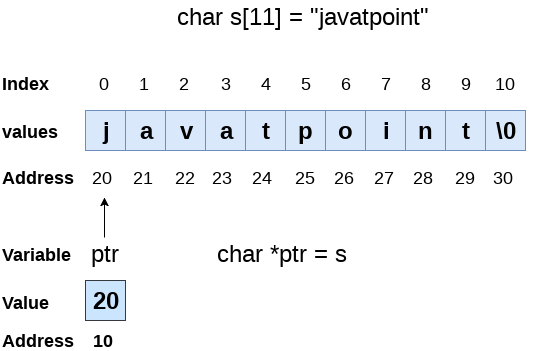TheDeveloperBlog.com
C-Sharp | Java | Python | Swift | GO | WPF | Ruby | Scala | F# | JavaScript | SQL | PHP | Angular | HTML
C Strings
C Strings with programming examples for beginners and professionals covering concepts, Difference between char array and string literal, String Example in C, control statements, c array, c pointers, c structures, c union, c strings and more.
C StringsThe string can be defined as the one-dimensional array of characters terminated by a null ('\0'). The character array or the string is used to manipulate text such as word or sentences. Each character in the array occupies one byte of memory, and the last character must always be 0. The termination character ('\0') is important in a string since it is the only way to identify where the string ends. When we define a string as char s[10], the character s[10] is implicitly initialized with the null in the memory. There are two ways to declare a string in c language.
Let's see the example of declaring string by char array in C language.
char ch[10]={'j', 'a', 'v', 'a', 't', 'p', 'o', 'i', 'n', 't', '\0'};
As we know, array index starts from 0, so it will be represented as in the figure given below. 
While declaring string, size is not mandatory. So we can write the above code as given below:
char ch[]={'j', 'a', 'v', 'a', 't', 'p', 'o', 'i', 'n', 't', '\0'};
We can also define the string by the string literal in C language. For example: char ch[]="TheDeveloperBlog"; In such case, '\0' will be appended at the end of the string by the compiler. Difference between char array and string literalThere are two main differences between char array and literal.
String Example in C
Let's see a simple example where a string is declared and being printed. The '%s' is used as a format specifier for the string in c language. #include Output Char Array Value is: TheDeveloperBlog String Literal Value is: TheDeveloperBlog Traversing String
Traversing the string is one of the most important aspects in any of the programming languages. We may need to manipulate a very large text which can be done by traversing the text. Traversing string is somewhat different from the traversing an integer array. We need to know the length of the array to traverse an integer array, whereas we may use the null character in the case of string to identify the end the string and terminate the loop. Hence, there are two ways to traverse a string.
Let's discuss each one of them. Using the length of stringLet's see an example of counting the number of vowels in a string.
#include<stdio.h>
void main ()
{
char s[11] = "TheDeveloperBlog";
int i = 0;
int count = 0;
while(i<11)
{
if(s[i]=='a' || s[i] == 'e' || s[i] == 'i' || s[i] == 'u' || s[i] == 'o')
{
count ++;
}
i++;
}
printf("The number of vowels %d",count);
}
Output The number of vowels 4 Using the null characterLet's see the same example of counting the number of vowels by using the null character.
#include<stdio.h>
void main ()
{
char s[11] = "TheDeveloperBlog";
int i = 0;
int count = 0;
while(s[i] != NULL)
{
if(s[i]=='a' || s[i] == 'e' || s[i] == 'i' || s[i] == 'u' || s[i] == 'o')
{
count ++;
}
i++;
}
printf("The number of vowels %d",count);
}
Output The number of vowels 4 Accepting string as the input
Till now, we have used scanf to accept the input from the user. However, it can also be used in the case of strings but with a different scenario. Consider the below code which stores the string while space is encountered.
#include<stdio.h>
void main ()
{
char s[20];
printf("Enter the string?");
scanf("%s",s);
printf("You entered %s",s);
}
Output Enter the string?TheDeveloperBlog is the best You entered TheDeveloperBlog It is clear from the output that, the above code will not work for space separated strings. To make this code working for the space separated strings, the minor changed required in the scanf function, i.e., instead of writing scanf("%s",s), we must write: scanf("%[^\n]s",s) which instructs the compiler to store the string s while the new line (\n) is encountered. Let's consider the following example to store the space-separated strings. #include Output Enter the string?TheDeveloperBlog is the best You entered TheDeveloperBlog is the best Here we must also notice that we do not need to use address of (&) operator in scanf to store a string since string s is an array of characters and the name of the array, i.e., s indicates the base address of the string (character array) therefore we need not use & with it. Some important pointsHowever, there are the following points which must be noticed while entering the strings by using scanf.
Pointers with stringsWe have used pointers with the array, functions, and primitive data types so far. However, pointers can be used to point to the strings. There are various advantages of using pointers to point strings. Let us consider the following example to access the string via the pointer.
#include<stdio.h>
void main ()
{
char s[11] = "TheDeveloperBlog";
char *p = s; // pointer p is pointing to string s.
printf("%s",p); // the string TheDeveloperBlog is printed if we print p.
}
Output TheDeveloperBlog 
As we know that string is an array of characters, the pointers can be used in the same way they were used with arrays. In the above example, p is declared as a pointer to the array of characters s. P affects similar to s since s is the base address of the string and treated as a pointer internally. However, we can not change the content of s or copy the content of s into another string directly. For this purpose, we need to use the pointers to store the strings. In the following example, we have shown the use of pointers to copy the content of a string into another.
#include<stdio.h>
void main ()
{
char *p = "hello TheDeveloperBlog";
printf("String p: %s\n",p);
char *q;
printf("copying the content of p into q...\n");
q = p;
printf("String q: %s\n",q);
}
Output String p: hello TheDeveloperBlog copying the content of p into q... String q: hello TheDeveloperBlog Once a string is defined, it cannot be reassigned to another set of characters. However, using pointers, we can assign the set of characters to the string. Consider the following example.
#include<stdio.h>
void main ()
{
char *p = "hello TheDeveloperBlog";
printf("Before assigning: %s\n",p);
p = "hello";
printf("After assigning: %s\n",p);
}
Output Before assigning: hello TheDeveloperBlog After assigning: hello
Next TopicC gets() and puts()
|
Related Links:
- C# this
- C# static
- C# static class
- C# static constructor
- C# Main Thread
- C# Thread Sleep
- C# Structs
- C# Enum
- C# Properties
- C# Aggregation
- C# Member Overloading
- C# Method Overriding
- C# Base
- Learn C Programming Language Tutorial
- C# Polymorphism
- C# Sealed
- C# Abstract
- C# Interface
- C# Access Modifiers
- C# Namespaces
- C# Encapsulation
- C# Strings
- C# Exception Handling
- C# try-catch
- C# finally
- C# User Defined Exceptions
- C# Checked and Unchecked
- C# SystemException
- C# FileStream
- C# StreamWriter
- C# StreamReader
- C# TextWriter
- C# TextReader
- C# BinaryWriter
- C# FileInfo
- C# DirectoryInfo
- C# BinaryReader
- C# StringWriter
- C# StringReader
- C# Serialization
- C# Deserialization
- C# System.IO Namespace
- C# Collections
- C# List
- C# HashSet
- C# SortedSet
- C# Stack
- C# Queue
- C# LinkedList
- C# Dictionary
- C# Inheritance
- C# SortedDictionary
- C# SortedList
- C# Generics
- C# Delegates
- C# Reflection
- C# Anonymous Function
- C# Multithreading
- C# Thread Life Cycle
- C# Thread Class
- C# Threading Example
- C# Thread Abort
- C# ThreadPriority
- C# Thread Synchronization | C# Lock
- C Identifiers
- C Switch Statement
- C break statement
- C Array
- C Operators
- C Format Specifier
- C Pointers
- C Pointer to Pointer
- C if else statement
- C Programming Interview Questions (2021)
- C Loop
- C# Jagged Arrays
- C continue statement
- C goto statement
- C String Functions
- C strlen() function
- C strcpy() function
- C strcat() function
- C Union
- C vs C++
- Top 26 C# Interview Questions (2021)
- C strcmp() function
- C strrev() function
- C strlwr() function
- C strupr() function
- C strstr() function
- C Math Functions
- C# Thread Join
- C# Thread Name
- C Preprocessor
- C Macros
- C #include
- C #define
- C #undef
- C #ifdef
- C #ifndef
- C #if
- C #else
- C #error
- Learn C# Tutorial
- C #pragma
- C Expressions
- C Data Segments
- C Programs
- C# if else
- C# Do While Loop
- C Program to reverse number
- C Program to swap two numbers without using third variable
- C Program to print hello without semicolon
- C Program without main()
- C Program to print Alphabet Triangle
- C# Example
- C Program to convert Decimal to Binary
- C Program to convert Number in Characters
- C Strings
- C gets() and puts()
- C Program to print Number Triangle
- C Program to generate Fibonacci Triangle
- C# switch
- C# For Loop
- C# While Loop
- C# Break Statement
- C# Continue Statement
- C# Array to Function
- C# Multidimensional Array
- C# Goto Statement
- C# Comments
- C# Function
- C# Call By Value
- C# Call By Reference
- C# Out Parameter
- C# Arrays
- C# Params
- C# Array Class
- C# Command Line Arguments
- C# Object and Class
- C# Constructor
- C# Destructor


